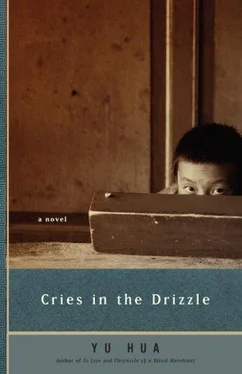Sickly as she was, Li Xiuying naturally placed a high priority on hygiene. Her world was already narrow and confining, and if it was in a mess as well she would be hard put to sustain her fragile life. I was responsible for almost the entire job of keeping her room tidy. Window cleaning was the most important chore, to be performed twice a day so as to ensure that sunlight could reach her underwear unsullied by any impurities. The biggest challenge came when I opened the window, for I was expected to do a quick and thorough job of cleaning the outside of the pane, and it was a tall order for a child my age to perform this task with the requisite dispatch. Li Xiuying was truly too weak to withstand a gust of wind. She told me that wind was the worst thing in the world, for it blew dust, germs, and bad smells all over the place, making people sick, making people die. She made wind sound so dreadful that in my young imagination it almost took on the features of a green-faced, long-toothed monster, fastening itself to my window at night and rubbing the pane till it shook.
After concluding her vilification of the wind, Li Xiuying asked me in a conspiratorial hush, “Do you know where dampness comes from?”
Then she answered her own question. “It's blown here by the wind!” she exclaimed. The sudden fury with which she said this gave me such a fright that my heart started pounding.
Glass played a vital role in Li Xiuying's life, interposing itself in transparent form between her and the outside world, protecting her from the intrusion of wind and dust and at the same time safeguarding her special relationship with sunshine.
Even now I remember that in the afternoon, when the sunlight was blocked by the slope of the mountain opposite, Li Xiuying would stand in front of the window, gazing disconsolately at the red tint in the sky behind the mountain, as though she had been deserted and yet at the same time was unwilling to accept her abandonment. She told me softly, “The sun wanted to shine in my room, but on its way here the mountain abducted it.”
Her voice traverses time and carries to my ears today, as though to remind me how long she and the sunlight had enjoyed cordial relations. The mountain, by contrast, was a despot that had forcibly appropriated her sunshine.
Wang Liqiang was a busy man, away at work the whole day, and he did not count on me simply to pull my weight doing chores: what he seemed to be hoping was that the noise I made around the house would alleviate the melancholy to which Li Xiuying was prone. In fact, however, Li Xiuying did not set much store by my presence, for she preferred to spend her time bemoaning her fate and seldom concerned herself with me. She would harp on about how this was sore or that was giving her trouble, but when I nervously appeared in front of her, looking forward to doing some little job that would make her life easier, she would act as though I wasn't there. Sometimes my astonishment at her health problems would simply have the odd effect of making her feel proud of them.
Soon after I moved into her house, I noticed that a newspaper had been spread out on the floor of her room; on top of the yellowing pages a pile of little white bugs had been laid out to dry. Li Xiuying was in the habit of seeking medical advice from a variety of authorities, and these fearsome little insects were a folk remedy that she had just acquired. When she boiled them in water and swallowed them one by one as calmly as if they were grains of rice, I paled at the sight. My horror actually rather pleased her: she flashed me a smile and said contentedly, “These things are good for you.”
Li Xiuying could be terribly self-centered, but deep down she was ingenuous and kindhearted. If she was prone to suspicion, that's just a common failing in women. When I was new there, she worried that I would get up to no good, so she designed a trial. Once when I was cleaning the window of one of the other rooms, I found fifty cents on the windowsill. This was a startling find: for me at the time, fifty cents was a huge sum. When I took the money through and handed it to her, my surprise at the discovery and my honesty in reporting it took a big weight off her mind. She told me straightforwardly that this had been a test and praised me in a heartwarming tone of voice, complimenting me in such extravagant terms that I was almost moved to tears. Her trust in me never wavered throughout the whole five years, and when later I became the target of accusations at school she was the only person who believed in my innocence.
Strong and fit though he was, Wang Liqiang looked out of sorts when he was at home, and he often sat alone by himself with a frown on his face. But once during the first summer I was with them, he had me sit on the windowsill and told me about the river at the foot of the mountain and the wooden boats that plied its waters. His description, simple though it was, somehow managed to conjure up a clear picture in my mind. For the most part he was a mild-mannered person, but at times he would say shocking things. He had a favorite little wine cup, which was placed on top of the wireless and enjoyed the distinction of being the only decorative item in the whole house. So as to make sure I fully recognized its value he told me very sternly that if I was ever to break the cup he would wring my neck. At the time he was holding a cucumber, and with a sharp tearing sound he twisted it into two, saying, “Just like that.” This scared me so much I felt a chill around my nape.
As I approached my seventh birthday, the change that I had just gone through seemed to have made me a different person altogether. At this stage I must have been at a loss to know what to make of it all. Drifting with the tide, too young to fight the current, I had transformed in the blink of an eye from the Sun Guanglin of the rowdy Southgate house into a boy who was easily spooked by Li Xiuyings groans and Wang Liqiang's sighs.
It did not take me long to gain a familiarity with the town of Littlemarsh, but in the early days I was consumed by curiosity.Those spindly streets paved with stone slabs seemed to carry on forever, just like the river that flowed past Southgate. Sometimes at dusk when Wang Liqiang grasped my hand in a fatherly way and took me out for a walk, I would fondly imagine that if we just kept going we would eventually reach Beijing. But somehow, as my mind was following this train of thought, I would suddenly notice that we had arrived back home. For a long time I was perplexed by this enigma: though we seemed to keep walking in the same direction, we always ended up back at the house. Most of all I marveled at the pagoda that overlooked Littlemarsh, for out of one of its windows a tree was growing. Inspired by this sight, I once had the strange feeling that a tree might perhaps sprout from Li Xiuying's mouth, or if not a tree some grass at least.
The paving stones would often give a creak and rock to and fro when you stepped on them. Particularly on rainy days, if you stamped hard on one side, a spray of muddy water would shoot up from the other. For a long time I thought this was the most wonderful game, and whenever I had the chance to get out of the house it was the first thing I wanted to do. I was seized by an urge to splash the trousers of a passerby, but timidity made me resist the temptation, for I felt sure this would put me at the receiving end of some horrendous punishment. Later I saw three older boys walk along the street, picking up chamber pot covers propped up outside people s doorways. They tossed the lids up in a way that made them spin through the air delightfully. Outraged residents came rushing out of their houses, but could do little more than curse the boys while they ran off, laughing with glee. From this I realized the advantages of showing a clean pair of heels, for then punishment becomes unlikely and enjoyment is prolonged. So afterward, when I saw a girl walk by in a smart outfit, I stamped on a loose flagstone. As filthy water spattered her pants, I implemented the next phase of my plan — running away. Unfortunately even though my desire had been satisfied, no pleasure ensued. The girl did not unleash a torrent of abuse nor make any effort to pursue me, but simply stood there in the middle of the street, crying her heart out. The longer she went on crying, the more I felt panic rising inside me.
Читать дальше












